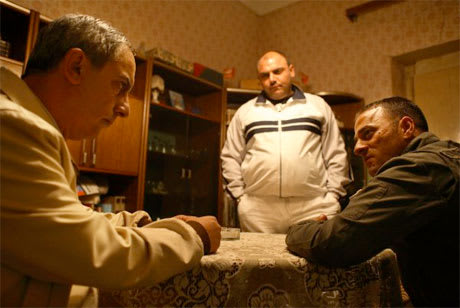The big cheat of most mafia movies is that they purport to represent a terrible social trap while glorifying it at the same time. Gomorrah is not one of those films. You can't imagine mobsters thrilling to every desperate moment and imitating its best lines. As a matter of fact, the filmmakers are in hiding, fearful of the wrath of the gangsters they've spectacularly debunked.
Eschewing the standard rise-and-fall narrative, the film exposes the Camorra crime network not as romantic antiheroes or American Gangster Robin Hoods but as a negative social force as brutal as any legal corporation. People are absorbed into the organization out of desperation and then find that they can't leave. Areas are devastated as wars break out and petty criminals imitate the big boys with localized brutality. Various decent people are ensnared and it becomes impossible to tell who's a villain and who's an innocent forced into brutality against their will.
Neither ecstatically violent nor self-righteously moralistic, the film quietly details a corrosive culture where you can't take the right side even if you want to — watching even the unpleasant characters meet ugly ends is sad and pathetic, as everybody seems set up in this Kafka hell.
The film's plea is to unravel the poisoned relations that not only do violence and instil fear but distort identity, so as to make peace with the insanity. You'll never look at Scarface the same way again, as characters emulate his macho cool only to wind up vicious, pathetic and headed for a bad end.
Gomorrah explodes the idea that "outlaw capitalism" is in any way separate from the legal kind and any more attractive for being run on society's margins. Gomorrah is an amazing movie you miss at your peril.
(Seville)Eschewing the standard rise-and-fall narrative, the film exposes the Camorra crime network not as romantic antiheroes or American Gangster Robin Hoods but as a negative social force as brutal as any legal corporation. People are absorbed into the organization out of desperation and then find that they can't leave. Areas are devastated as wars break out and petty criminals imitate the big boys with localized brutality. Various decent people are ensnared and it becomes impossible to tell who's a villain and who's an innocent forced into brutality against their will.
Neither ecstatically violent nor self-righteously moralistic, the film quietly details a corrosive culture where you can't take the right side even if you want to — watching even the unpleasant characters meet ugly ends is sad and pathetic, as everybody seems set up in this Kafka hell.
The film's plea is to unravel the poisoned relations that not only do violence and instil fear but distort identity, so as to make peace with the insanity. You'll never look at Scarface the same way again, as characters emulate his macho cool only to wind up vicious, pathetic and headed for a bad end.
Gomorrah explodes the idea that "outlaw capitalism" is in any way separate from the legal kind and any more attractive for being run on society's margins. Gomorrah is an amazing movie you miss at your peril.




